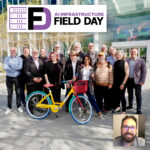|
|
This video is part of the appearance, “Google Cloud Presents at AI Infrastructure Field Day 2 – Afternoon“. It was recorded as part of AI Infrastructure Field Day 2 at 13:00 - 16:30 on April 22, 2025.
Watch on YouTube
Watch on Vimeo
Michal Szymaniak, Principal Engineer at Google Cloud, presented on Rapid Storage, a new zonal storage product within the cloud storage portfolio, powered by Google’s foundational distributed file system, Colossus. The goal in designing Rapid Storage was to create a storage system that offers the low latency of block storage, the high throughput of parallel file systems, and the ease of use and scale of object storage, while also being easy to start and manage. Rapid Storage addresses customers’ limitations when working with GCS, where they often tier to persistent disk for lower latency or seek parallel file system functionality.
Rapid Storage is fronted by Cloud Storage Fuse, aiming to provide a parallel file system experience with insane throughput of 20 million requests per second and six terabytes per second throughput on the data side, while maintaining the benefits of cloud storage like 11 nines of durability within a zone and three nines of availability. The sub-millisecond latency for random reads and appends, achieved after opening a file using the Fuse interface, makes it significantly faster than other hyperscalers. A separate data stack enables this predictable performance focused on high performance, where GCS emphasizes manageability and scalability.
Rapid Storage, available as a new storage class in zonal locations, leverages Colossus in a particular cloud zone, bringing it to the forefront of cloud storage. By accessing cloud storage directly from the front end, with only one RPC hop away from data on physical hard drives, Rapid Storage minimizes latency and physical hops. Integrating gRPC, a stateful streaming protocol, and hierarchical namespace enhances file system-friendly operations and performance. While currently in private preview with a target for allow-list GA later this year, users are encouraged to sign up and provide feedback.
Personnel: Michal Szymaniak









